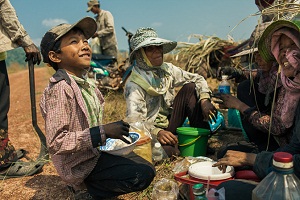
Download The United Nations has called for an end to child labour by 2016.
But in Cambodia, the practice is still rampant.
One of the largest employers of child labour is Phnom Penh Sugar Company, owned by a ruling party official.
The company is accused of exploiting child labour and grabbing land from villagers.
Borin Noun has more.
It’s 7 in the morning.
Workers from Kamong Speu are coming to work at the sugar cane plantation owned by the Phonm Penh Sugar Company.
Most of them are children, like 14-year-old orphan Nong Chetra.
“It’s hard work here. We have to be at the farm from morning until evening. If we don’t finish our work, we will be fined. The boss will report us to the sugar cane plantation company owner.”
Cambodian law classifies child labourers as children aged 14 or under and prohibits them from working in jobs that are dangerous or harmful to their education.
The sugar plantation is both.
“I can’t read. I want to study but I have to support my family. My family is very poor.”
These children are also victims of land grabbing by the sugar company.
With thousands being evicted from their farms, working in the cane fields is their only option.
Nong Chetra’s parents died when he was only 1. He now lives with his grandmother, 60-year-old Yun Sim.
“My land here was confiscated. It’s so difficult to survive. Many rice fields were seized so we have no fields to cultivate. My grandson had to give up his school. Life is very difficult today. He’s now worried about his future.”
And it’s not an isolated case.
Some 1.5 million Cambodians under the age of 18 are forced to work, according to the International Labour Organisation.
13-year-old Chham Chhin had to quit school to work here in the cane fields.
“I earn about 2.5 US dollars a day. That’s how we survive. I want to go back to school, but it’s impossible.”
At least one-third of the students at the Trapang Phnum secondary school decide to stop studying and start working.
School director, Ouen Vana, explains why.
“I think it’s a severe social issue for our students here. They have to find money for their families. So they give up school. Some of them return to continue their studies, but they have difficulty learning. So most of them decide to leave and don’t come back to school.”
Last year, the European Parliament called on the European Comission to end trade preferences for Cambodian agricultural products, such as sugar, that are linked to human rights abuses.
Continued violations of the Rights of the Child could result in the suspension of trade agreements.
In January, the opposition party sent a letter calling on the Prime Minister to take serious measures against the Phnom Penh Sugar Company for its use of child labour.
And recently a company representative who doesn’t want to reveal his name, says they have stopped employing children.
“We know that it’s illegal. So we don’t force them to work in our fields, it’s their decision. Our company regrets that they have to quit school. Right now we would like to announce that they can work in our field, but they have to be at least 16 years old.”
And an internal memo from the company has warned contractors responsible for hiring plantation labourers that anyone caught hiring workers under the age of 18 will be fined 12 US dollars.
But Nong Chetra continues to work in the field...
Grandma Yun Sim is waiting for her grandson to come home.
“When we have no money to buy meals, we wait for my grandson to come. If he comes home with money, then we can buy something. It’s very difficult for us. I still want my grandson to return to school... but he refused. He says if he stops working, we won’t be able to survive.”














